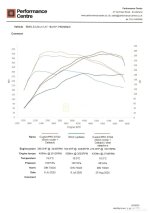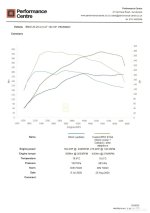Smartbear said:Pbondar said:Meanwhile back on topic..
Looking at MACK’s and Smartbear’s dyno runs its very interesting ..if you are a sad bunny..
You can see in all cases the original N20 torque curve with a small hole around 3,200 and then a gentle rise to a flattened peak at 3,500 and then a slow n steady decline to the red line..as a result the BHP curve rises with a flattening at 3,200 them hits a peak around 4,500-5,000 rpm then flattish to the redline..
What’s interesting is how the tuners have worked their craft..I wonder how much tailoring these guys can/do do..
I notice some tweaks peak later at the expense of more mid range ‘variations’ and less mid range torque others peak earlier but are ‘smoother’ having a broader range of peak hp..although maybe less peak power overall..
Is it the tuner, is the difference between pneumatic and later electronic waste gate control, or is it other factors..?
I think the maps are different for the different types of actuators, which you would expect for the electronically operated version. I don’t think it necessarily gives more absolute power as such but possibly a degree more control.
That would only make a small difference in pick up after a gear change/throttle off situation rather than more peak power :?
Rob
With my car being a 04/2012 car I've always assumed its got the pneumatic actuator. I thought the change came much later, at 2013-14. But that said I've never actually bothered to check. So it does look like outright performance wasn't behind the change, I'm assuming it was a reliability issue.
I think for me what the before runs show is how deliberately poorly mapped the 20i is from the factory, by extension the 18i mapping must be even worse. You wouldn't really expect to see a BHP curve that flat on a healthy well tuned engine, whether its normal aspirated or Turbo/Supercharged. The torque looks more akin to what you would expect to see on turbo'd diesel not a petrol and highlights what I'd always thought with this engine, that it runs out of steam very early.
Will at PTorque told me the main element BMW are using to handicap the performance is by deliberately retarding the ignition quite considerably. It's the obvious thing to use. There are a few other bits and pieces they use but the ignition is the main driver. Putting outright performance aside by doing this they are also hurting efficiency and ultimately fuel economy. Hypothetically if you has three cars 18i, 20i and 28i all driven in the same way be the same driver etc etc then the 28i would return the best economy. The effect in reality might be miniscule but should still be there.
I did ask Will if he sees much variance between engines even in standard trim when he maps them and he told me he did and it at times can be surprising big. I guess this alludes to the potential variances in production tolerancing. But it's probably more to do with servicing, the freshness of key components such as coils and plugs and in particular the grade of fuel used. Obvious a similar car on 95 or even 97 octane hasn't got a cat in hells of producing the same performance as one run exclusively on 99 octane when mapped to suit the higher octane stuff.



